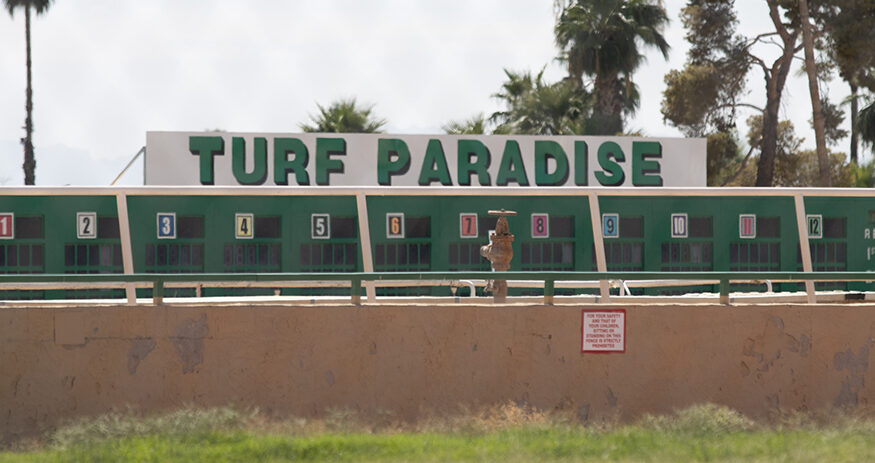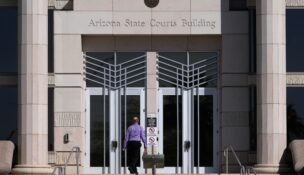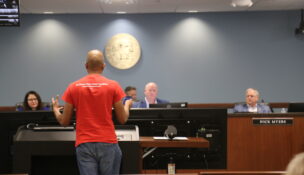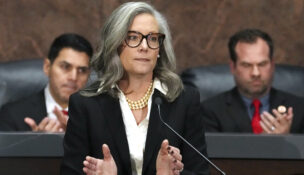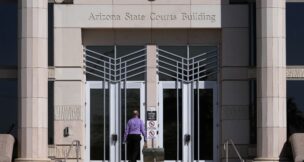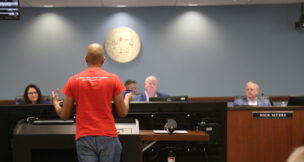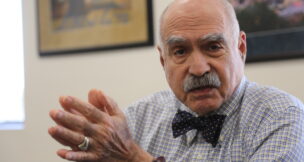Lawmakers face legal challenge over $1M gift to horse racing
Howard Fischer, Capitol Media Services//September 11, 2025//
Lawmakers face legal challenge over $1M gift to horse racing
Howard Fischer, Capitol Media Services//September 11, 2025//
Key Points:
-
State lawmakers face accusations of illegally giving away public funds
-
AG Mayes agrees a $1 million appropriation to Turf Paradise violates Gift Clause
-
AG previously targeted questionable public spending
State lawmakers are once again on the cusp of being found to have illegally given away public funds.
In new court filings, Attorney General Kris Mayes said she agrees with challengers that a $1 million appropriation to Phoenix racetrack Turf Paradise in the new state budget violates the Gift Clause of the Arizona Constitution. The move paves the way for Maricopa County Superior Court Judge Michael Herrod to sign an order on his desk declaring the funding illegal and barring the Arizona Department of Racing from distributing the cash.
In exchange, Howard Mechanic and Ralph Hess, the plaintiffs in the case, will drop their objection to lawmakers giving another $1 million to the Arizona Thoroughbred Breeders Association to be used to promote racing and provide more dollars to give to winners of horse racing in the state.
If the names of the challengers seem familiar, they should.
Both are Prescott residents. And Hess is a retired Yavapai County Superior Court judge.
More to the point, the pair were the plaintiffs in a lawsuit in which Maricopa County Superior Court Judge Scott Blaney just months ago declared the Legislature in violation of the Gift Clause, this one for earmarking $15.3 million in 2023 for the nonprofit foundation that runs the Prescott Frontier Days rodeo.
That issue has since been resolved with lawmakers recrafting the law to give the money directly to the city of Prescott to make improvements to the city-owned rodeo grounds.
But that may not be an option to fix the problem in this case. That’s because, unlike the rodeo grounds, Turf Paradise is privately owned.
It was that fact that caused Mechanic and Hess to sue over the $1 million appropriation.
Central to the issue is the Gift Clause. It makes it illegal for the state to “make any donation or grant, by subsidy or otherwise, to any individual, association or corporation.”
That does not bar the state from giving money to private entities. But it does require that the funding serves a public purpose and includes adequate “consideration,” meaning taxpayers are getting some benefit from the expenditure.
In filing suit last month, Mechanic and Hess said neither appropriation meets the test because they don’t require either Turf Paradise or the Arizona Thoroughbred Breeders Association to actually perform any public function in exchange for the money. The pair also said nothing in the appropriation gives either the state or the Arizona Department of Gaming any control or supervision over how the money is used.
Sen. John Kavanagh, who supported putting the dollars into the budget for the fiscal year that began July 1, disagreed. He said there is a public purpose.
“I think there’s an economic benefit to the state just in terms of revenue that tourists bring in, not to mention providing recreational amenity for residents and tourists alike,” he told Capitol Media Services when the lawsuit was filed. “We do it all the time.”
Danny Adelman with the Arizona Center for Law in the Public Interest, who filed suit on behalf of Hess and Mechanic, told the judge that’s not good enough.
He said the question of whether there is the legally required “consideration” is based on “direct benefits that are bargained for as part of the contracting party’s promised performance.” And Adelman said it does not include “anticipated indirect benefits.”
This isn’t the first time the state has given public funds for horse racing. Adelman said lawmakers set aside $10 million in both 2021 and 2022, with $6 million in 2023 and $5.5 million in 2024.
“The state has been giving away similar gifts for many years,” Mechanic told Capitol Media Services. He also said this agreement, coupled with the ruling about the funds for Prescott Frontier Days, should serve as a reminder of what is and is not allowed.
“I hope both the Legislature and the various state departments will now stop such expenditures,” Mechanic said. “The most effective way to avoid future gifts is for the state to develop a regular procedure to analyze the public costs and public benefits of most proposed expenditures intended to go to private parties.”
Mayes would not comment on the specific decision to settle the case. But press aide Richie Taylor said on Sept. 10 that it is in line with her views on the issue.
“Attorney General Mayes believes lawmakers need to be more mindful of the Gift Clause when making appropriations,” he said.
“The Gift Clause requires that public dollars be spent for true public purposes,” Taylor said. “Playing fast and loose with that standard risks litigation and wastes taxpayer money.”
This isn’t the first time that Mayes has said a line needs to be drawn around what constitutes a proper use of public funds.
Last year, she targeted money spent by the publicly funded Arizona Commerce Authority to wine and dine corporate CEOs who had come to Arizona for sporting events.
Mayes said the decision to entertain top executives could be considered to have a public purpose. She said it could be seen as part of the organization’s responsibility to market the state and get companies to expand or relocate here.
But Mayes said the amount of money spent on what were called “CEO Forums” – $2.4 million at the 2023 Super Bowl and Waste Management Phoenix Open over the prior six years — violates the Gift Clause.
“They give valuable benefits to a limited class of private persons without receiving any legally cognizable benefit in return,” she said.
The Commerce Authority got the message. It agreed to use mostly private funds at future events.
That most immediately played out at the 2024 Waste Management Open, in which the authority had a $123,000 budget for the five-day event.
Of that, $42,000 was to come from taxpayer dollars under the control of the authority.
But the tab for the big-ticket item — $65,000 for tickets to the event for corporate executives and sponsoring a suite — was picked up by the Greater Phoenix Leadership. That organization of 150 business leaders bills itself as a CEO roundtable promoting public policy initiatives.
Another $14,000 for hotel rooms at the downtown Phoenix Hyatt Regency became the responsibility of the Arizona Tourism & Lodging Association, made up of statewide hotels and resorts, tourism attractions, sports teams, airlines and related business partners. And Horizon Strategies, a lobbying and consulting firm, was responsible for $2,500 for “hospitality items ranging from snacks and sunscreen to hats and hand sanitizer.
What that left for taxpayers to pick up — and what Mayes found acceptable — was $25,000 to rent room space, catering, and audio-visual equipment for “informational sessions” with the invited guests, $12,000 for their transportation around Phoenix, and $5,000 for marketing materials which Scott Rooney, the authority’s legal counsel, said included mailings and items “highlighting Arizona’s value proposition.”
In reaching a deal with the Commerce Authority, Mayes made it clear that there has to be some proportional consideration for the expenditure of state funds. And she said the mere fact that businesses might relocate here is insufficient.
“Paying taxes applicable to all is not a consideration,” Mayes said. “Businesses inherently generate taxes and stimulate the economy, so permitting such impacts to justify public funds of private ventures would eviscerate the Gift Clause, even if the private ventures would not exist without public funds.”

